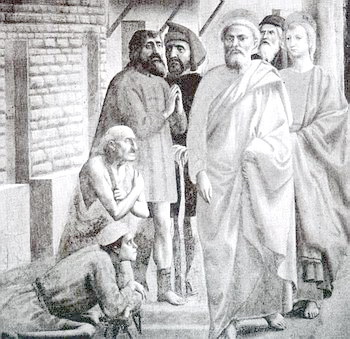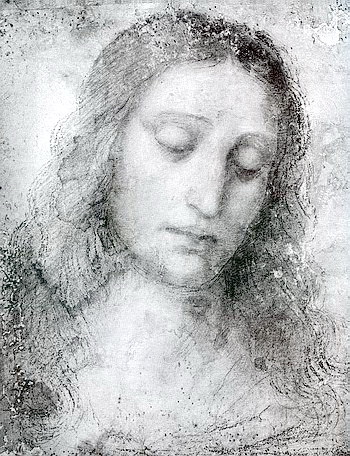
Sermon on the Mount
Introduction
Jesus Christ's1 personality is indescribable. One cannot but be deeply attracted to this enigmatic, gentle, yet powerful figure. In the past, questions were raised as to whether his life is not mainly a fiction, a legend constructed around a much lesser personality. But today there seems to be a consensus that Jesus not only existed, but that he was truly as great as the accounts of his life portray him. Jesus has been described variously as a "true man of God", as the "Son of God", and even as what in India is called an Avatar. Whether or not Christ was quite similar to the person represented in the Gospels is perhaps not so important, for in any case what remains is his extraordinary influence on mankind.
How do we know about Jesus? Mainly through the Gospels. The word "gospel" (which means "good news ") is used throughout the New Testament to describe the life and works of Jesus Christ as well as the contents of the Christian message. The coining of the Christ was considered the fulfilment of God's promise to mankind as foretold by the Prophets of the Old Testament; it is also viewed as the inauguration of anew epoch in the relation between God and man. The most relevant facts about Jesus Christ were preserved by oral tradition before being recorded. The written Gospels that have come down to us are based primarily on this oral tradition. The earliest Gospel, that of St. Mark, is thought to have been written between AD 65 and 70.
1. ''Christ", a name given to Jesus, means "the anointed one", or "The Messiah", the expected Savior of the Jews.
Page-119
There are four Gospels, those of St. Matthew, St. Mark, St. Luke, and St. John. The first three show many similarities. However, the Gospel according to St. John is , quite different from the others. It seems to be more an interpretation than a record of the life of Jesus, and it makes implicit reference to certain ideals of religious philosophy current at the time. This last Gospel is thought to have been written at the end of the first century AD.
According to the Gospels, Jesus 'public life was very short a mere three years. So it is all the more amazing that Christ was able to set in motion what represents one of the major turns of human history. He spent the first thirty years of his life in Nazareth, a village of Galileo in Palestine. His father Joseph was a carpenter and Jesus became one in turn. One striking incident occurred when Jesus was about twelve years old (Luke 2: 41-51). On the occasion of a family trip, Jesus disappeared. After searching for three days, his anxious parents found him in the temple, deep in discussion with a group of religious scholars who were very much impressed by the knowledge and wisdom of this youth. When Jesus' mother, Mary, softly reprimanded him for causing them worry, Jesus answered enigmatically: "How is it that you sought me? Did you not know that I must be in my Father's house?" Mary did not fully understand, but, as the Gospel says, she quietly "kept all these things in her heart."
According to the accounts, something remarkable had happened to Mary even before Jesus was born. An angel had appeared to Mary to tell her that she would conceive a child through the power of the Holy Spirit (Luke 1: 26-35). Shortly after Jesus was born, Mary and Joseph took the infant to the temple to fulfill the Jewish rituals that follow the birth of a male child. An old and revered sage was in the temple that day. At the sight of the child he went into ecstasy, and made mysterious predictions about him. The sage expressed his gratitude to God for being allowed to see with his own eyes the Savior of Israel (Luke 2: 22-35). Whenever Mary appears in the Gospels she is shown as a most beautiful example of surrender to the Divine's will. For this reason she has rightly inspired profound devotion among Christians the world over. Before entering public life, Jesus went alone into the desert and fasted for forty days. There, Satan, the Lord of Falsehood severely tempted him, even offering him the kingdom of the world. Jesus resisted these temptations (Matt. 4: 1- 12). Soon after, he selected a small group of young men, mostly manual workers, who would later be known as the Twelve Apostles.' With them and a growing band
1. Apostles: the group of twelve men Jesus chose to be his special followers and helpers. The word "apostle" means "messenger". The twelve apostles were: Simon (called Peter) and his brother Andrew; James and his brother John, the sons of Zebedee; Philip; Bartholomew; Thomas;
Matthew, the tax collector; James, son of Alphaeus; Thaddaeus; Simon the Patriot; and Judas Iscariot.
Page-120
of followers, Christ traveled through Palestine over a period of three years. He performed miracles and delivered his message, often through parables.1
It is indeed moving to see Jesus in action, as described in the Gospels. What tenderness and sweetness this handsome young man in the prime of his life lavishes on his fellow human beings, calling forth the best in them, pleading with them to understand the marvel of God's love and to respond to it! He is particularly kind to those who acknowledge their inner misery and ask for forgiveness. But at times he can be fearlessly harsh towards those who feel self-content, calling them "white- washed tombs ", "hypocrites ", and so on. Jesus ' interaction is generally characterised by gentleness. What a wonderful thing it must have been to have those eyes of Christ, full of light, rest upon you and call you!
But the men of the world cannot bear to be told and shown their real worth. The increasing popularity of Jesus was a cause of 'great envy. Soon enough, the priests and Pharisees2 were conspiring, and by skillfully manipulating the fickle moods of the crowd, they finally managed to have Jesus arrested. Jesus was taken before the priests, and when questioned declared that he was indeed the Messiah, the son of God. The priests found him guilty of blasphemy, a capital crime under Jewish law. He was then led before Pilate, the Roman Governor, who alone could pronounce the death sentence. Pilate asked Jesus whether he was the King of the Jews and Jesus did not deny it, but he said, "My kingdom is not of this world. " Under Roman law, Jesus' claim to be King could merit the death sentence. Yet Pilate was reluctant. He brought Jesus before the Jewish chief priests and said, "I find no crime in him. " But when the priests saw Jesus they cried out, "Crucify him, crucify him!" "Shall I crucify your King? " asked Pilate. They answered, "We have no King but Caesar." Pilate relented and handed Jesus over to be crucified (John cc 18 & 19.) But as the Gospels tell us, Jesus rose from his tomb three days after the crucifixion. He spent forty more days among his disciples, giving his final teaching. Then, after a last admonition, he literally vanished ascending into the air.
Among the many inspiring sermons that Christ gave, the Sermon on the Mount is perhaps the most remarkable. In the Christian world, the scene of the Sermon on the Mount is one of the best known. According to St. Matthew (5: 1 to 7: 29), in whose Gospel we find the most complete account, a great multitude had assembled.
I. Parable: an allegorical story dealing with ordinary life from which a moral message or religious truth is taught. 2. Pharisee: one of a Jewish religious school of those times, marked by their strict observance of the law of Moses and other religious ordinances which had been added through the centuries. They were known to be more careful of the outward forms than the spirit of religion, and found the unconventional teachings of Jesus a threat. In modem English the word Pharisee has come to mean a self-righteous, hypocritical person.
Page-121
Already Jesus was famous for his words and for his miracles. Expectations were high that he might be the Messiah so ardently awaited in Israel. We may well imagine the eagerness of the crowd when he began to speak. And then the surprise: what kind of words are these? In the harsh world of those days, where oppression, cruelty and revenge were the norm, Jesus demanded a radical change of consciousness, accompanied by a reversal of the accepted patterns of behaviour.
Those listening to him must have been taken aback by such words, spoken with calm authority. The style and tone of the whole sermon are those of a major pronouncement, a fundamental declaration.
In the Sermon on the Mount we can find the essential themes of the Christian message, such as the equality of all men before God, and the essential unity or brotherhood of mankind. Also strongly underlined is the significance of human life as a preparation for an afterlife in heaven, seen as a reward for having led a life dedicated to God. Hence pervading the text is the idea of a "Last Judgement" where everything will be put in its proper place and those chosen by God will enter the "Kingdom of Heaven ". By "Kingdom of Heaven "Jesus was in effect referring to the true "Kingdom of God", which is to be experienced in another dimension, the spiritual realm. According to Jesus' teaching, the aim of life is to discover the kingdom of God within oneself, and thus become worthy to be accepted into the kingdom of heaven after this life.
And yet, we may ask, what is it that makes the Sermon on the Mount such an inspiring part of the religious literature of all times? Is it not the underlying message that God is not a distant and indifferent ruler, but rather that He is truly like a father, that He cares for everyone and everything, and that His love is all-encompassing and can be experienced in the intimacy of each human heart? Suddenly God becomes much closer to man. Even the numerous references to punishment do not really obscure as they could have the luminous message that is so predominant throughout this long passionate exhortation. Addressing a vast crowd, Jesus is obviously trying to speak to each individual present, calling each one to go within himself, to look at his life and, from that inner poise, to begin a different life altogether. What pervades the Sermon on the Mount and makes it so convincing is its call for utter truthfulness, for inner sincerity. How penetrating are these words:
You are the salt of the earth; but if salt has lost its taste, how shall its saltiness be restored? It is no longer good for anything except to be thrown out and trodden under foot by men. You are the light of the world. A city set on a hill cannot be hid. Nor do
Page-122
men light a lamp and put it under a bushel, but on a stand, and it gives light to all in the house. Let your light so shine before men, that they may see your good works and give glory to your Father who is in heaven.
Such a message goes beyond the boundaries of any creed or religion: it is a universal message.
The Sermon on the Mount provides Christ's followers with, to use a Sanskrit word, a "Dharma ", a law of discipline for growing out of the lower into the higher life. In it there is a rule of action and of relations with ones fellow human beings which tends to result in a spiritual companionship, a fellowship of those united by the teachings of the Divine Instructor. Jesus proposes a severe self-discipline: "Love your enemies and pray for those who persecute you. " The Sermon's call for fraternity corresponds to a deep aspiration in mankind, even if it is difficult to achieve.
Indeed as we study the history of mankind we find that this Sermon has been a potent instrument for bringing the followers of Christ, whether from East or West, into some kind of living brotherhood. We know that persecutions have been suffered by those who dared to follow Christ; but the sufferings only helped to impress on the human mind the idea of making sacrifices for high ideals. By creating a mental soil fit for the growth of altruism, it sowed the seeds of love, sweetness and humanity in the hard, selfish human soil. In our own day, the influence of the message of Christ is to be found in the professed ideals of modern society such as humanitarianism and aspirations to liberty, equality and fraternity. These are the translations into the social and political sphere of the spiritual truth that Christ put forward to mankind. Such is the strength of the exceptional message of Jesus Christ that it has been the keystone of one of the most important turns in the evolution of humanity. If only for that, such inspired pieces as the Sermon on the Mount deserve to be read with utmost respect.

Page-123
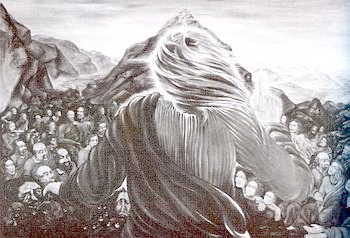
Seeing the crowds, he went up on the mountain, and when he sat down his disciples came to him. And he opened his mouth and taught them, saying:
"Blessed are the poor in spirit, for theirs is the kingdom of heaven.
"Blessed are those who mourn, for they shall be comforted.
"Blessed are the meek, for they shall inherit the earth.
"Blessed are those who hunger and thirst for righteousness, for they shall be satisfied.
"Blessed are the merciful, for they shall obtain mercy.
"Blessed are the pure in heart, for they shall see God.
"Blessed are the peacemakers, for they shall be called sons of God.
"Blessed are those who are persecuted for righteousness' sake, for theirs is the kingdom of heaven.
"Blessed are you when men revile you and persecute you and utter all kinds of evil against you falsely on my account. Rejoice and be glad, for your reward is great in heaven, for so men persecuted the prophets who were before you.
"You are the salt of the earth; but if salt has lost its taste, how shall its saltness be restored? It is no longer good for anything except to be thrown out and trodden under foot by men.
"You are the light of the world. A city set on a hill cannot be hid. Nor do men light a lamp and put it under a bushel, but on a stand, and it gives light to all in the house. Let your light so shine before men, that they may see your good works and give glory to your Father who is in heaven.
"Think not that I have come to abolish the law and the prophets; I have come not to abolish them but to fulfill them. For truly, I say to you, till heaven and earth pass away, not an iota, not a dot, will pass from the law until all is accomplished. Whoever then relaxes one of the least of these commandments and teaches men so, shall be called least in the kingdom of heaven; but he who does them and teaches them shall be called great in the kingdom of heaven. For I tell you, unless your righteousness exceeds that of the scribes and Pharisees, you will never enter the kingdom of heaven.
"You have heard that it was said to the men of old, 'You shall not kill; and whoever kills shall be liable to judgment.' But I say to you that every one
Page-125
who is angry with his brother shall be liable to judgment; whoever insults his brother shall be liable to the council, and whoever says, 'You fool!'. shall be liable to the hell of fire. So if you are offering your gift at the altar, and there remember that your brother has something against you, leave your gift there before the altar and go; first be reconciled to your brother, and then come and offer your gift. Make friends quickly with your accuser, while you are going with him to court, lest your accuser hand you over to the judge, and the judge to the guard, and you be put in prison; truly, I say to you, you will never get out till you have paid the last penny. "You have heard that it was said, 'You shall not commit adultery?' But I say to you that every one who looks at a woman lustfully has already committed adultery with her in his heart. If your right eye causes you to sin, pluck it out and throw it away; it is better that you lose one of your members than that your whole body be thrown into hell. And if your right hand causes you to sin, cut it off and throw it away; it is better that you lose one of your members than that your whole body go into hell.
"It was also said, 'Whoever divorces his wife, let him give her a certificate of divorce.' But I say to you that every one who divorces his wife, except on the ground of unchastity, makes her an adulteress; and whoever marries a divorced woman commits adultery.
"Again you have heard that it was said to the men of old, 'You shall not swear falsely, but shall perform to the Lord what you have sworn.' But I say to you, Do not swear at all, either by heaven, for it is the throne of God, or by the earth, for it is his footstool, or by Jerusalem, for it is the city of the great King. And do not swear by your head, for you cannot make one hair white or black. Let what you say be simply 'Yes' or 'No'; anything more than this comes from evil. "You have heard that it was said, 'An eye for an eye and a tooth for a tooth.' But I say to you, do not resist one who is evil. But if any one strikes you on the right cheek, turn to him the other also; and if any one would sue you and take your coat, let him have your cloak as well; and if any one forces you to go one mile, go with him two miles. Give to him who begs from you, and do not refuse him who would borrow from you. "You have heard that it was said, 'You shall love your neighbour and hate your enemy.' But I say to you, Love your enemies and pray for those who persecute you, so that you may be sons of your Father who is in heaven;
Page-126
for he makes his sun rise on the evil and on the good, and sends rain on the just and on the unjust. For if you love those who love you, what reward have you? Do not even the tax collectors do the same? And if you salute only your brethren, what more are you doing than others? Do not even the Gentiles do the same? You, therefore, must be perfect, as your heavenly Father is perfect.
"Beware of practising your piety before men in order to be seen by them; for then you will have no reward from your Father who is in heaven. "Thus, when you give alms, sound no trumpet before you, as the hypocrites do in the synagogues and in the streets, that they may be praised by men. Truly, I say to you, they have their reward. But when you give alms, do not let your left hand know what your right hand is doing, so that your alms may be in secret; and your Father who sees in secret will reward you.
"And when you pray, you must not be like the hypocrites; for they love to stand and pray in the synagogues and at the street corners, that they may be seen by men. Truly, I say to you, they have their reward. But when you pray, go into your room and shut the door and pray to your Father who is in secret; and your Father who sees in secret will reward you. "And in praying do not heap up empty phrases as the Gentiles do; for they think that they will be heard for their many words. Do not be like them, for your Father knows what you need before you ask him. Pray then like this:
Our Father who art in heaven,
Hallowed be thy name.
Thy kingdom come,
Thy will be done,
On earth as it is in heaven.
Give us this day our daily bread;
And forgive us our debts,
As we also have forgiven our debtors;
And lead us not into temptation,
But deliver us from evil.
"For if you forgive men their trespasses, your heavenly Father also will forgive you; but if you do not forgive men their trespasses, neither will
Page-127
your Father forgive your trespasses.
"And when you fast, do not look dismal, like the hypocrites, for they disfigure their faces that their fasting may be seen by men. Truly, I say to you, they have their reward. But when you fast, anoint your head and wash your face, that your fasting may not be seen by men but by your Father who is in secret; and your Father who sees in secret will reward you. "Do not lay up for yourselves treasures on earth, where moth and rust consume and where thieves break in and steal, but lay up for yourselves treasures in heaven, where neither moth nor rust consumes and where thieves do not break in and steal. For where your treasure is, there will your heart be also.
"The eye is the lamp of the body. So, if your eye is sound, your whole body will be full of light; but if your eye is not sound, your whole body will be full of darkness. If then the light in you is darkness, how great is the darkness!
"No one can serve two masters; for either he will hate the one and love the other, or he will be devoted to the one and despise the other. You cannot serve God and mammon.
"Therefore I tell you, do not be anxious about your life, what you shall eat or what you shall drink, nor about your body, what you shall put on. Is not life more than food, and the body more than clothing? Look at the birds of the air; they neither sow nor reap nor gather into barns, and yet your heavenly Father feeds them. Are you not of more value than they? And which of you by being anxious can add one cubit to his span of life? And why are you anxious about clothing? Consider the lilies of the field, how they grow; they neither toil nor spin; yet I tell you, even Solomon in all his glory was not arrayed like one of these. But if God so clothes the grass of the field, which today is alive and tomorrow is thrown into the oven, will he not much more clothe you, 0 men of little faith? Therefore do not be anxious, saying, 'What shall we eat?' or 'What shall we drink?' or 'What shall we wear?' For the Gentiles seek all these things; and your heavenly Father knows that you need them all. But seek first his kingdom and his righteousness, and all these things shall be yours as well. "Therefore do not be anxious about tomorrow, for tomorrow will be anxious for itself. Let the day's own trouble be sufficient for the day. "Judge not, that you be not judged. For with the judgment you pronounce
Page-128
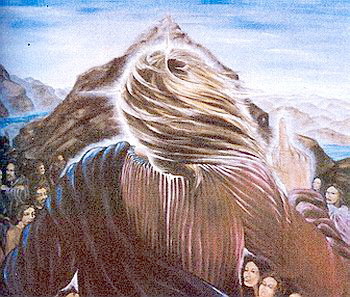
Painting by Rolf, Auroville
you will be judged, and the measure you give will be the measure you get. Why do you see the speck that is in your brother's eye, but do not notice the log that is in your own eye? Or how can you say to your brother, 'Let me take the speck out of your eye,' when there is the log in your own eye? You hypocrite, first take the log out of your own eye, and then you will see clearly to take the speck out of your brother's eye.
"Do not give dogs what is holy; and do not throw your pearls before swine, lest they trample them under foot and turn to attack you. Ask, and it will be given you; seek, and you will find; knock, and it will be opened to you. For every one who asks receives, and he who seeks finds, and to him who knocks it will be opened. Or what man of you, if his son asks him for bread, will give him a stone? Or if he asks for a fish, will give him a serpent? If you then, who are evil, know to give good gifts to your children, how much more will your Father who is in heaven give good things to those who ask him! So whatever you wish that men would do to
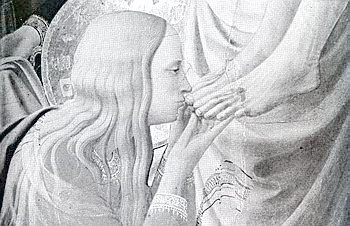
The Descent from the Cross (detail), By Italian Artist Fra Angelico
Page-130
you, do so to them; for this is the law and the prophets.
"Enter by the narrow gate; for the gate is wide and the way is easy, that leads to destruction, and those who enter by it are many. For the gate is narrow and the way is hard, that leads to life, and those who find it are few.
"Beware of false prophets, who come to you in sheep's clothing but inwardly are ravenous wolves. You will know them by their fruits. Are grapes gathered from thorns, or figs from thistles? So, every sound tree bears good fruit, but the bad tree bears evil fruit. A sound tree cannot bear evil fruit, nor can a bad tree bear good fruit. Every tree that does not bear good fruit is cut down and thrown into the fire. Thus you will know them by their fruits.
"Not every one who says to me, 'Lord, Lord,' shall enter the kingdom of heaven, but he who does the will of my Father who is in heaven. On that day many will say to me, 'Lord, Lord, did we not prophesy in your name, and cast out demons in your name, and do many mighty works in your name?' And then will I declare to them, 'I never knew you; depart from me, you evildoers.'
"Every one then who hears these words of mine and does them will be like a wise man who built his house upon the rock; and the rain fell, and the floods came, and the winds blew and beat upon that house, but it did not fall, because it had been founded on the rock. And every one who hears these words of mine and does not do them will be like a foolish man who built his house upon the sand; and the rain fell, and the floods came, and the winds blew and beat against that house, and it fell; and great was the fall of it."
And when Jesus finished these sayings, the crowds were astonished at his teaching, for he taught them as one who had authority, and not as their scribes.
St Matthew 5:1 to 7:29, from The Holy Gospel, Revised Standard Version
(Bombay; St Paul Publications, 1975) pp. 21-30
Page-131
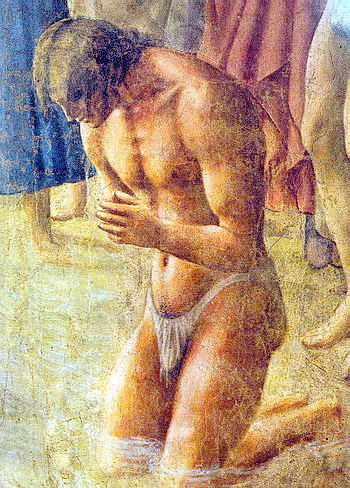
The Baptism of the Neophytes, (detail) fresco by the Italian painter
Masaccio(1401-1428)Neophytes were new converts to Christianity.
Page-132
The importance to the world of the Hebrews is not primarily political. It comes from the fact that from 1200 to 400 BC, the Hebrews developed a religion that was unique among ancient peoples and that has given their history enormous significance to the modem world. Their religion has helped the Hebrews to maintain their identity, even to the present day, and it has provided the basis for three of the major religions of the modem world: Judaism, Christianity, and Islam.
The largest part of the Hebrew scriptures (called today the Old Testament by Christians) was written down by many different authors between about 1000 and 150 BC. It includes rules of law and of religious behaviour, legend, history, poetry, prophecy and apocalyptic visions. But it is given unity by the fundamental belief in an enduring relationship between God and his people. In the first books there are stories preserved by the Hebrews about the beginnings of their history. Recent archeological discoveries have confirmed the historical value of many of these stories but there is not enough evidence to have any certainty about the history of the Hebrews before 1000 BC. According to the scriptures, all Hebrews were descended from Abraham, who had migrated from Ur in Mesopotamia. His grandson, Jacob, had twelve sons who were believed to be the progenitors of the twelve tribes into which the Hebrews were later divided. After a spell in Egypt, first as invitees, later as slaves, the Hebrews were led through the Sinai Desert for forty years by Jahweh (God)to guide them out of Egypt. It is in the desert that Jahweh gave Moses the Law, which included the Ten Commandments and a long catalogue of religious, ethical and juridical regulations.
From the thirteenth to the eleventh century BC, the Hebrews established themselves in what is now known as Palestine, which they conquered from the Cannanites. The twelve tribes were then united in one kingdom with its capital at Jerusalem. After the first three kings (Saul, David, Solomon), there was secession and two kingdoms were created (Israel and Judah). After 750 BC, the kingdom of Israel disappeared forever, with the establishment of the Assyrian Empire. The smaller kingdom of Judah was able to survive, at times independent, at times a vassal kingdom, under the five empires that successively dominated the area (the Assyrian, Chaldean, Persian, Seleucid and Roman empires). By the second century AD, it had ceased to exist as an independent entity.
State of the known world at the time of Jesus Christ
The main characteristic of these times is the overwhelming importance of the Roman Empire. It encompassed the whole of the Mediterranean World including Gaul, Spain, Greece, Asia Minor and Egypt.
In India, two dynasties were ruling the larger part of the sub-continent: the Kushan Dynasty over north-western India, and the Andhra dynasty over central India.
In China, for already two centuries, the Han emperors had been ruling and they would continue for two more centuries. Under them, China was unified and relatively peaceful and prosperous.
Page-133
A brief account of the early stages of Christianity
Pilate and the Pharisees thought that Jesus' crucifixion was the end of the matter. But the disciples remained faithful; for they were convinced that Jesus had risen from the dead and had repeatedly appeared to his followers. The Resurrection gave them courage and confidence. Strong in their faith, they began to make converts among the Jews of Palestine and Syria. At this time they began to be called Christians.
The new religion was at first only a Jewish sect, ignored by the rest of the world and bitterly opposed by many Jews. At this critical point the conversion of Saul of Tarsus enabled Christianity to broaden its appeal. Saul, though Greek in education and Roman in citizenship, was a fiercely orthodox Jew who felt it was his duty to attack the Christians. In the midst of his campaign he suffered a physical collapse (in the Acts of the Apostles it is said he was blinded); on his recovery he announced his conversion to the faith he had opposed. He took the name of Paul and began preaching Christianity in the cities of Asia Minor and Greece, and eventually in Rome itself.
It was Paul who made Christianity attractive to the non-Jewish inhabitants of the Roman world. He persuaded early Christian leaders that many Jewish ritual practices could be abandoned; one could be a Christian without first having to become a Jew. He also explained Christian doctrine in terms that were understandable to men thinking in terms of Greek philosophy. In his Epistles, he began the work of building a Christian philosophy and theology that could appeal to men of all races.
Meanwhile, other disciples were spreading the faith outside Palestine. Peter, the leader of the group, probably went to Rome; very early tradition holds that he was head of the Roman Church and was martyred there. Churches were established in Egypt, Asia Minor, Greece, and later in Gaul and in Spain. Stories of the sayings and doings of Jesus were collected and by the end of the first century began to take shape as the Gospels. To these were added the letters and Acts of the Apostles, and so the body of writings that eventually became the New Testament was formed.
Christianity was a vigorous, active faith at a time when the old state religions were losing their credibility and the mystery cults were not very precise about their doctrines. Its appeal was greatest among slaves and labourers from eastern Mediterranean countries. Like the Jews, they were a people apart who refused to take part in the public rituals honouring the state and the emperor.
Although this Christian refusal to worship was technically the equivalent of treason, the imperial government paid only intermittent attention to the sect in the first and second centuries. Most Christians belonged to the lower classes during this period, and the government took note of them only when there was political or social unrest (as in Rome under Nero or in Bithynia under Trajan). Even then, it persecuted Christians largely for political reasons; it made no attempt to wipe out the religion.
As a result the early Church had been able to develop its theology and to create a remarkable administrative system, modeled more or less on the administrative system of the. Empire. It was important for the scattered members of the new faith to keep in touch with one another and to preserve uniformity of doctrine. The most respected members of each congregation became priests
Page-134
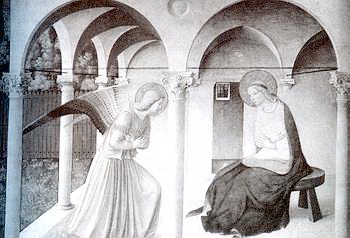
The Annonciation : the angel announces to Mary that she is going to
give birth to Jesus, fresco by the Italian painter and monk Fra Angelico ( 1395-1455)
("elders"), and in each city one priest was designated as bishop ("overseer"). The bishop was responsible for supervising all the Christian congregations in his city and in the surrounding villages. By the end of the second century some bishops (precursors of the later archbishops) were recognised as leaders in their provinces. The systematic organisation of the early Church was an innovation in the ancient world and helped establish the supremacy of Christianity over the many other religions of the Empire. No similar system existed for the pagan or mystery cults; the priests of Jupiter in one city, for example, were entirely independent of those in other cities.
During the third century Christianity began to attract members from all classes. Earlier the educated classes of the Empire, broadminded by tradition, had been offended by the exclusiveness of the Christians, by their unwillingness to admit that there might be truth in other religions. But in the troubled third century when economic decline, civil war, barbarian raids, and plague affected nearly every family and signaled confusion and decay in almost every aspect of civilised life the very firmness of Christian beliefs began to make them attractive. Similarly, the unswerving morality of the Christians and their belief in the fatherly love of God offered security in a time of
Page-135
confusion. Finally, the extreme other-worldliness of the Christians, which had seemed mere foolishness to all but the slaves and the poor in the affluent second century, fitted well with the intense desire in the chaotic third century for future happiness.
Christianity grew rapidly enough during the third century to alarm some of the emperors. They were annoyed by Christian lack of patriotism; these zealots would neither sacrifice to the emperor nor serve the state. This disregard of religion (it was even called "atheism") was sure to rouse the anger of the gods. There were some severe and prolonged periods of persecution during the century. The worst and longest began under Diocletian, who hated any kind of disobedience, and reached a peak with Galerius. But this persecution does not seem to have reduced the number of Christians greatly, even in the East, where it was most intense.
Diocletian, an innovator to the end, abdicated in 305 and became one of the few Roman emperors to die peacefully. But his elaborate provisions for an orderly succession were soon disregarded, and a series of civil wars put five different generals in control of various parts of the Empire. One of these generals was Constantine, who completely reversed Diocletian's policy of persecuting Christians.
Scholars have long argued about the reasons for and the sincerity of Constantine's conversion to Christianity. His mother is said to have been a Christian, and certainly he had some idea of the doctrines and the power of the religion before he became emperor. On the other hand, he had held command in Gaul, where Christians were neither numerous nor influential. Constantine cannot have believed that there were enough politically active Christians in his part of the Empire to make any difference in the struggle for power with rival generals. When he invoked the help of the Christian God, he must have been motivated by religious conviction, not by political expediency. Perhaps he thought that he was only tapping a new source of semi-magical power, but he surely did not think that he was gaining thousands of Christian recruits for his army. The decisive moment in Constantine's religious life came when he was about to meet his strongest opponent for the imperial title at the battle of the Milvian Bridge (near Rome) in 312. Just before the battle Constantine is said to have had a vision of a cross in the sky surrounded by the words in hoc signo vinces ("in this sign shalt thou conquer"). Convinced that the Christian God had helped him to victory, he ordered his troops to carry Christian insignia from that time on. Soon, in 313, Constantine (and the remaining co-emperor who still ruled with him) issued the Edict of Toleration ending the persecution of Christians.
Constantine himself received baptism only on his deathbed, a not uncommon precaution at that time. But, though not a full member, he supported the Church throughout his reign, thus enabling it to become the dominant religion of the Empire during the fourth century.
Page-136
|
St Peter healing the sick with his shadow (detail), fresco by the Italian Renaissance painter Masaccio(1401-1428) |
|
A Few dates
|
27BC-AD |
Principate of Augustus over the Roman Empire |
|
4BC |
Birth of Jesus. |
|
AD14-AD37 |
Principate of Tiberius. |
|
AD26 |
After having been a carpenter at Nazareth, Jesus begins his public life. |
|
AD30 |
Crucifixion of Jesus. |
|
Resurrection and ascension. |
|
|
Paul's conversion. |
|
|
AD45-47 |
Paul's first mission. |
|
AD58-60 |
Paul imprisoned by Felix, procurator of Judea. |
|
AD61-64 |
Persecution of Christians by Nero. |
|
Death of Peter and Paul in Rome. |
|
|
AD60-100 |
The four Gospels. |
Page-137
Suggestions for further reading
Bultmann, Rudolf. Jesus and the Word. Fontana, 1958.
Carpenter, Humphrey. Jesus. London: Oxford University Press, 1980.
Durant, Will. The Story of Civilization: P. Ill, Caesar and Christ. New York: Simon & Schuster, 1972.
Grant, Robert. A Historical Introduction to the New Testament. Fontana, 1971.
Holy Gospel, The. Bombay: St. Paul Publications, Revised Standard Version, 1975.
Reick, Bo. The New Testament Era. London: A & C Black, 1964.
Schweitzer, Albert. The Quest of the Historical Jesus. London: A & C Black, 3rd ed. 1954.

Page-138

Page-139
